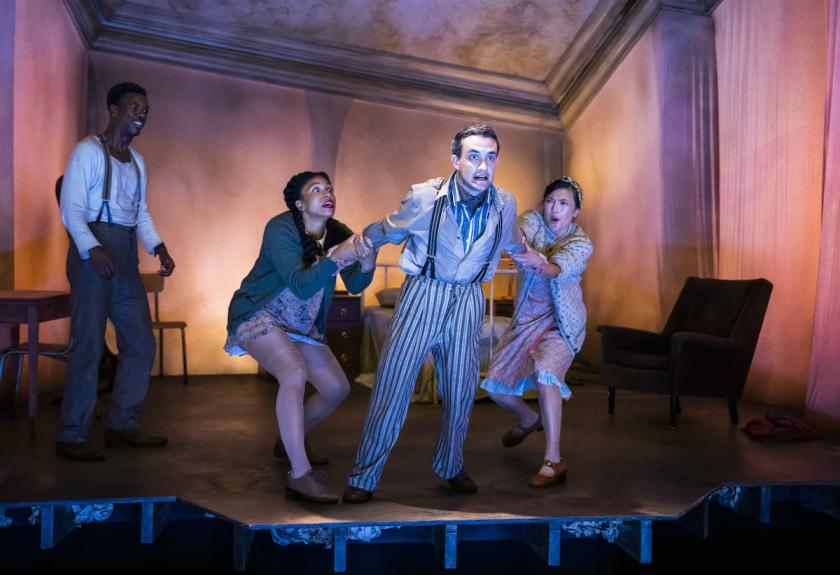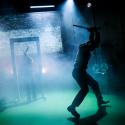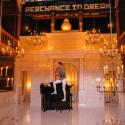Franz Kafka’s Metamorphosis is a novella whose cultural resonance has echoed loudly down the years. As a modernist metaphor for alienation in our times it has frequently been adapted for the stage. There have been classic, and popular, adaptations by Steven Berkoff and by David Farr and Gísli Örn Gardarsson for Vesturport theatre company.
This latest version, by national treasure Lemn Sissay, comes to the Lyric Hammersmith after opening its national tour at the Curve, Leicester, last September. It is produced by Frantic Assembly, whose work specialises in a mixture of exciting dance moves, thrilling music and acrobatic physical theatre.
Kafka’s classic 1915 story opens with some of the most well-known words in European literature: “As Gregor Samsa awoke one morning from uneasy dreams he found himself transformed in his bed into a gigantic insect.” His metamorphosis means he is unable to go to work and support his family, and his new appearance (the original German translates as “monstrous vermin”) frightens both colleagues and family members. Only his sister Grete really helps him. But even she has to get a job to plug the hole in family incomes, as do Gregor’s mother and father, so he becomes increasingly neglected. You just know that things are not going to end well.
While Kafka’s original begins with Gregor’s shock at his own transformation, Sissay – perhaps influenced by the novella’s ending – focuses on Grete, and sketches in a back story which shows Gregor’s work life as a travelling salesman. The daily grind of everyday work is communicated through repeats, dialogue repetitions, movement repetitions, you know, repetitive repetitions. Because this is reminiscent of Arthur Miller’s Willy Loman, offering a rather literal explanation for Gregor’s burn out, it feels both unnecessary and tedious – a 90-minute play is being extending into more than two hours.
The focus on Grete delivers some acutely poetic moments, such as a memorable passage about her vampire violin, and the mildly incestuous quality of her rapport with her brother is suggested as a kind of metaphor for the suffocation of family life. Later on, the revelation of the true relationship of these siblings provides an original interpretation of the family scene. In the meantime, we at last get to Gregor’s transformation into a monstrous entity, and some vivid stage imagery is released by Frantic’s director Scott Graham: I really liked the scene in which the family is chased around the room as Gregor climbs the walls and swings from the light fitting. Later, his insect carapace is beautifully suggested with the use of four chairs.
In the past, Frantic Assembly have often struggled to find the right writer for their style of physical theatre, and this time is no exception. Sissay is a great poet, but he’s no dramatist. His characters, from Gregor to Grete to Mr Samsa senior to Mrs Samsa to the Chief Clerk and the impoverished family’s lodger talk, talk, talk. In the playtext, their speeches run for pages and pages and pages. Some passages are verbally beautiful – I love Gregor’s surreal dream, the begging story and the lodger’s malapropisms – but a lot of the rest is redundant. Worse still – the words slow down the storytelling. A sharp parable becomes a tedious show.
So Sissay’s interesting additions to Kafka’s original, such as the focus on the teenage daughter Grete and her emotions, or his satire on how men perform their masculinity, are drowned out by the sheer excess of verbal adornment. The sad reality of how people neglect those in their lives that have become a burden – which is so relevant today with the decline of mental health services and the collapse of social care – gets somehow lost in the verbosity of the narrative. The emotional core of the story, which shows the cost of an oppressive work regime and how humans can be degraded by being seen as vermin (the racist element doesn’t need emphasising) evaporates.
But if this production lacks drama and gets slowed down in a welter of words, there are some striking images. At the beginning, a silk scarf serves as Grete’s dressing up item for her fantasies of an elegant life, while family relationships are illustrated by Frantic’s typical moves in which actors are lifted up and held high in the air. The set has a squalid spookiness and Graham does succeed in providing some moments of memorable visual pleasure, with the shabby room and exaggerated costumes designed by Jon Bausor, videos of early 20th fashion and strange modernistic stains by Ian William Galloway, and with gloomy ambient, slightly gothic, music by Stefan Janik. But all of this comes at a cost to the drama.
So Graham’s production struggles to accommodate a text that is much too long for the story, and his actors perform in a style that is meant to be expressionistic, but ends up being all in one key: loud and lacking in nuance. Only Felipe Pacheco’s turn as Gregor is athletic and highly expressive, although he has too little to do for long stretches, while Hannah Sinclair Robinson’s Grete is sincere and occasionally funny. Which is quite good fun. But Troy Glasgow as Mr Samsa and Louise Mai Newberry as Mrs Samsa are a bit too shouty for my taste, although Joe Layton (who plays both the Clerk and the lodger) has a nice sinister edge. Good stage pictures, shame about the text: a classic has metamorphosied into a bore.















Add comment